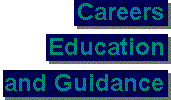
Education Index
School Leavers


 |
Main Index Education Index School Leavers |
 |
 |
Choosing an option post-16FE / Sixth formIn sixth form or at a local college you can study for A levels. A/S levels and GNVQs may also be available. At this level you need to select two or three subjects that you want to study, and therefore you need to think carefully about your choice. The subjects you choose will have a much greater effect on your future career options than those studied at GCSE. Schools will advise you about the subjects that link well together. There is less content in an AS course but it is not worth as much as a full A level.GNVQs are arranged in blocks so you can enter at any level providing you already have the appropriate qualifications. You need 4 GCSEs (A-C) or an Intermediate GNVQ to do an Advanced course. To do an Intermediate course you need one or two GCSEs (A-D) or a Foundation GNVQ. Advanced GNVQs are sometimes accepted as qualifications for university entrance. It depends on the university so you should investigate this beforehand if you want to take this route.
HE/FEAt an FE or HE institution you can study for a degree or higher vocational qualification. Take time to think about decisions and investigate all the options:
EmploymentChoices within employment are endless.
Self-employmentThis is not an easy option for a young person but there is advice and support available, both practical and financial. A careers adviser can help you think this through or you can contact your local TEC for advice.(See Agencies) |
| Index |  |
[ School Leavers ] [ A-Z Glossary | Careers Issues ] |
| Top | ||
|
|